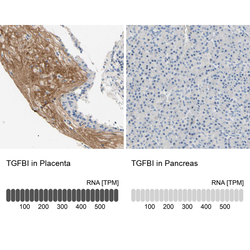HPA008612
antibody from Atlas Antibodies
Targeting: TGFBI
BIGH3, CDB1, CDGG1, CSD1, CSD2, CSD3, LCD1
Antibody data
- Antibody Data
- Antigen structure
- References [5]
- Comments [0]
- Validations
- Immunohistochemistry [1]
Submit
Validation data
Reference
Comment
Report error
- Product number
- HPA008612 - Provider product page

- Provider
- Atlas Antibodies
- Proper citation
- Atlas Antibodies Cat#HPA008612, RRID:AB_1857970
- Product name
- Anti-TGFBI
- Antibody type
- Polyclonal
- Description
- Polyclonal Antibody against Human TGFBI, Gene description: transforming growth factor, beta-induced, 68kDa, Alternative Gene Names: BIGH3, CDB1, CDGG1, CSD1, CSD2, CSD3, LCD1, Validated applications: IHC, Uniprot ID: Q15582, Storage: Store at +4°C for short term storage. Long time storage is recommended at -20°C.
- Reactivity
- Human
- Host
- Rabbit
- Conjugate
- Unconjugated
- Isotype
- IgG
- Vial size
- 100 µl
- Concentration
- 0.1 mg/ml
- Storage
- Store at +4°C for short term storage. Long time storage is recommended at -20°C.
- Handling
- The antibody solution should be gently mixed before use.
Submitted references Association between parity and pregnancy-associated tumor features in high-grade serous ovarian cancer.
Histopathologic and proteogenomic heterogeneity reveals features of clear cell renal cell carcinoma aggressiveness.
TGFBI protein high expression predicts poor prognosis in colorectal cancer patients.
SILAC-based quantitative proteomic approach to identify potential biomarkers from the esophageal squamous cell carcinoma secretome
Association of TCF4 and CLU polymorphisms with Fuchs’ endothelial dystrophy and implication of CLU and TGFBI proteins in the disease process
Sköld C, Corvigno S, Dahlstrand H, Enblad G, Mezheyeuski A, Sundström-Poromaa I, Stålberg K, Tolf A, Glimelius I, Koliadi A
Cancer causes & control : CCC 2024 Aug;35(8):1101-1109
Cancer causes & control : CCC 2024 Aug;35(8):1101-1109
Histopathologic and proteogenomic heterogeneity reveals features of clear cell renal cell carcinoma aggressiveness.
Li Y, Lih TM, Dhanasekaran SM, Mannan R, Chen L, Cieslik M, Wu Y, Lu RJ, Clark DJ, Kołodziejczak I, Hong R, Chen S, Zhao Y, Chugh S, Caravan W, Naser Al Deen N, Hosseini N, Newton CJ, Krug K, Xu Y, Cho KC, Hu Y, Zhang Y, Kumar-Sinha C, Ma W, Calinawan A, Wyczalkowski MA, Wendl MC, Wang Y, Guo S, Zhang C, Le A, Dagar A, Hopkins A, Cho H, Leprevost FDV, Jing X, Teo GC, Liu W, Reimers MA, Pachynski R, Lazar AJ, Chinnaiyan AM, Van Tine BA, Zhang B, Rodland KD, Getz G, Mani DR, Wang P, Chen F, Hostetter G, Thiagarajan M, Linehan WM, Fenyö D, Jewell SD, Omenn GS, Mehra R, Wiznerowicz M, Robles AI, Mesri M, Hiltke T, An E, Rodriguez H, Chan DW, Ricketts CJ, Nesvizhskii AI, Zhang H, Ding L, Clinical Proteomic Tumor Analysis Consortium
Cancer cell 2023 Jan 9;41(1):139-163.e17
Cancer cell 2023 Jan 9;41(1):139-163.e17
TGFBI protein high expression predicts poor prognosis in colorectal cancer patients.
Zhu J, Chen X, Liao Z, He C, Hu X
International journal of clinical and experimental pathology 2015;8(1):702-10
International journal of clinical and experimental pathology 2015;8(1):702-10
SILAC-based quantitative proteomic approach to identify potential biomarkers from the esophageal squamous cell carcinoma secretome
Kashyap M, Harsha H, Renuse S, Pawar H, Sahasrabuddhe N, Kim M, Marimuthu A, Keerthikumar S, Muthusamy B, Kandasamy K, Subbannayya Y, Prasad T, Mahmood R, Chaerkady R, Meltzer S, Kumar R, Rustgi A, Pandey A
Cancer Biology & Therapy 2014;10(8):796-810
Cancer Biology & Therapy 2014;10(8):796-810
Association of TCF4 and CLU polymorphisms with Fuchs’ endothelial dystrophy and implication of CLU and TGFBI proteins in the disease process
Kuot A, Hewitt A, Griggs K, Klebe S, Mills R, Jhanji V, Craig J, Sharma S, Burdon K
European Journal of Human Genetics 2012;20(6):632-638
European Journal of Human Genetics 2012;20(6):632-638
No comments: Submit comment
Supportive validation
- Submitted by
- Atlas Antibodies (provider)
- Enhanced method
- Orthogonal validation
- Main image

- Experimental details
- Immunohistochemistry analysis in human placenta and pancreas tissues using HPA008612 antibody. Corresponding TGFBI RNA-seq data are presented for the same tissues.
- Sample type
- Human
- Protocol
- Protocol
 Explore
Explore Validate
Validate Learn
Learn Immunohistochemistry
Immunohistochemistry